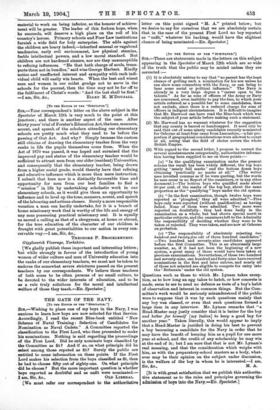[To viz EDITOR OT THE "SPECTATOR."]
SIE,—Your correspondent's letter on the above subject in the Spectator of March 12th is very much to the point at this juncture ; and there is another aspect of the case. After thirty years' trial of Forster's Education Act, the tone, manners, accent, and speech of the scholars attending our elementary schools are pretty much what they used to be before the passing of that Act. And why ? Simply because the custom still obtains of drawing the elementary teacher from the very ranks in life the pupils themselves come from. When the Act of 1870 was passed, it was hoped and surmised that the improved pay and status of the elementary teacher would be sufficient to attract men from our older (resident) Universities, and consequently that the elementary teacher, being drawn from a higher social grade, would thereby have that refining and educative influence which is more than mere instruction.
I submit that here now is a distinctly favourable time and opportunity for men from our hest families to find a -" mission" in life by undertaking scholastic work in our elementary schools, as it would give them an opportunity to influence and to level up the tone, manners, accent, and speech of the labouring and artisan classes. Surely a more responsible vocation a man can hardly undertake, for it is a branch of home missionary work that is worthy of the life and energy of any man possessing practical missionary zeal. It is equally as sacred a calling as that of a clergyman, at home or abroad, for the true education of the character of our children is fraught with great potentialities to our nation in every con- ceivable way.—I am, Sir, &c.,
(3) THEODORE P. BROCKLEHURST.
Giggleswick Vicarage, Yorkshire.
[We gladly publish these important and interesting letters ; 'but while strongly in favour of the introduction of young women of wider culture and men of University education into the ranks of our elementary teachers, we must not be taken to endorse the somewhat severe strictures passed on the present teachers by our correspondents. We believe those teachers of both sexes to be often persons of no small culture, to be devoted to the wider interests of education, and to be as a rule truly solicitous for the moral and intellectual welfare of those they teach.—ED. Spectator.]










































 Previous page
Previous page